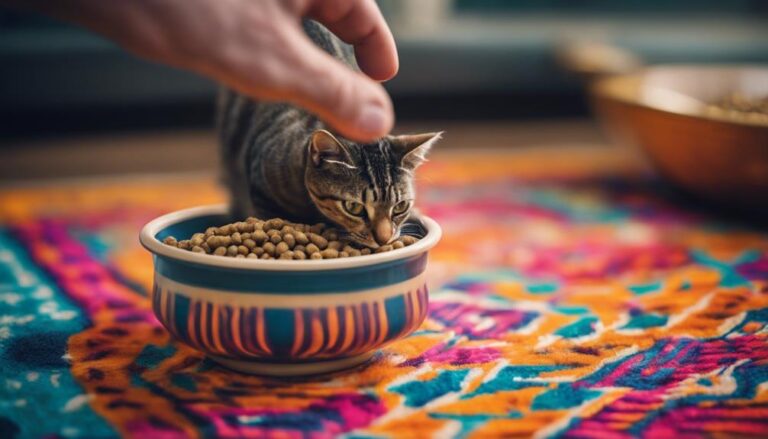Did you know that when it comes to cats and blueberries, there's a bit more to consider than just offering them a new snack? While cats can technically eat blueberries, there are some important factors to keep in mind to ensure their safety and well-being. So, before you decide to share some blueberries with your feline friend, let's explore the dos and don'ts of incorporating this fruit into their diet.
Blueberries and Cats: What You Should Know
When considering whether cats can safely consume blueberries, it's important to understand their dietary needs and limitations. While blueberries aren't a natural part of a cat's diet, they can enjoy them as an occasional treat in small quantities.
These little fruits pack a punch when it comes to health benefits, as they contain antioxidants that may be beneficial for your feline friend. However, it's crucial to remember that cats should primarily obtain their nutrients from complete and balanced cat food rather than relying on blueberries for essential vitamins and minerals.
To prevent any potential digestive issues, it's recommended to limit your cat's blueberry consumption to a few times a week. By incorporating blueberries into your cat's diet in moderation, you can provide them with a tasty and healthy snack while still prioritizing their overall nutritional needs.
Safe Ways to Feed Cats Blueberries
To ensure your cat enjoys blueberries safely, consider these tips for feeding them this nutritious fruit. Cats can eat blueberries in small quantities as an occasional treat. Before offering blueberries to your feline friend, make sure to wash them thoroughly and remove any stems or leaves.
Cats may prefer blueberries mashed, cut into pieces, or fed whole as a special snack. Remember that blueberries should be seen as a supplement to your cat's regular diet, not a replacement for their main food. Keep an eye on your cat for any signs of digestive issues after introducing blueberries into their meals.
Health Benefits of Blueberries for Cats
Blueberries offer a range of health benefits for your cat. They're rich in antioxidants that help combat free radicals, supporting your cat's immune system and joint health.
Additionally, the nutrients in blueberries can aid in digestion and contribute to your cat's overall well-being.
Nutrients in Blueberries
Rich in essential nutrients beneficial for your cat's health, blueberries provide a myriad of health benefits due to their antioxidant properties. Blueberries contain antioxidants that can help neutralize free radicals, vitamins C and K, fiber, manganese, and potassium, all of which contribute to your cat's well-being.
The vitamins present in blueberries can aid in supporting your cat's immune system, enhancing its ability to fight off illnesses and maintain overall health. By incorporating blueberries into your cat's diet in moderation, you can provide additional nutrients that may promote joint health due to the anti-inflammatory properties of these berries.
Offering your cat blueberries as a treat can be a tasty way to bolster its health.
Antioxidants for Cats
Consider incorporating blueberries into your cat's diet to harness the antioxidant benefits that can boost their immune system and joint health. Blueberries offer a range of advantages for your feline friend, such as:
- Antioxidants in blueberries help neutralize free radicals in your cat's body.
- These antioxidants may enhance your cat's immune system and promote better joint health.
- Blueberries are packed with essential nutrients like Vitamin C, K, fiber, and manganese, all beneficial for your cat's overall health.
- The high levels of antioxidants in blueberries are linked to reducing cholesterol, blood pressure, and heart disease in cats.
Make blueberries a part of your cat's diet to support their well-being and provide them with these fantastic health benefits!
Digestive Health Benefits
To support your cat's digestive health, incorporating blueberries into their diet can provide essential antioxidants that neutralize free radicals in their body. Blueberries contain antioxidants that contribute to overall digestive wellness in cats.
The fiber content in blueberries can aid in maintaining a healthy digestive system for your feline friend. By including blueberries in moderation, you can help promote good digestive health for your cat.
These antioxidants work to combat harmful free radicals, supporting your cat's gastrointestinal function. Ensuring a balanced diet that includes blueberries can be a tasty way to enhance your cat's digestive well-being.
Risks of Feeding Cats Blueberries
Feeding your cat blueberries might lead to potential digestive issues like vomiting or diarrhea if they eat too many. Be cautious as blueberries contain high sugar levels that could cause blood sugar spikes in your feline friend.
If your cat has diabetes or a sensitive stomach, it's best to limit their blueberry intake to prevent any health complications.
Potential Digestive Issues
Excessive consumption of blueberries by cats can result in digestive issues such as stomach upset. When feeding your cat blueberries, be mindful of the following:
- High Sugar Content: Blueberries contain natural sugars that may not be suitable for all cats, especially those with diabetes or obesity.
- Impact on Digestive Systems: The high sugar content in blueberries can lead to gastrointestinal problems in some cats.
- Limited Nutritional Benefits: Blueberries may not provide significant nutritional value compared to a diet based on meat, which is more appropriate for feline health.
- Monitor for Adverse Reactions: Watch out for any signs of digestive issues or adverse reactions when introducing blueberries into your cat's diet.
Allergic Reactions Possible
If your cat consumes blueberries, be aware that allergic reactions are possible. Cats may experience symptoms such as itching, swelling, or gastrointestinal upset if they're allergic to blueberries.
It's crucial to monitor your cat closely after introducing blueberries into their diet to watch for any adverse reactions. If you suspect that your cat is having an allergic reaction to blueberries, it's recommended to consult a veterinarian promptly.
While allergies to blueberries in cats are rare, they can still occur, underscoring the importance of careful observation. Remember to prioritize your cat's health and well-being by being vigilant and responsive to any signs of allergic reactions when feeding them blueberries.
Moderation in Cat Blueberry Consumption
When offering blueberries to your cat, remember to do so in moderation to prevent potential digestive issues. Cats should only consume blueberries in moderation, up to a few times a week, to avoid stomach upset and maintain their health.
Here are some important points to consider:
- Monitor Portion Sizes: Limit the amount of blueberries given to your cat to prevent digestive issues.
- Occasional Treat: Consider blueberries as an occasional treat, not a regular part of your cat's diet.
- Frequency Matters: Monitoring the frequency of blueberry treats is crucial for your cat's well-being.
- Health Concerns: Excessive blueberry consumption can lead to stomach upset in cats.
Introducing Blueberries to Your Cat
To introduce blueberries to your cat, wash them thoroughly before feeding to ensure their safety and cut them open to release the scent cats rely on to determine if they want to eat them. Cats eat blueberries, but it's essential to start slowly. You can mash or create a paste with blueberries to mix with your cat's regular food to introduce the flavor gradually.
Begin by offering one or two whole blueberries as a treat to see if your cat shows interest. Watch your cat's reaction closely; if you notice any digestive issues or allergies, consult a veterinarian. Introducing blueberries to your cat can be a fun and healthy addition to their diet, but always in moderation.
Remember that not all cats may enjoy blueberries, so it's essential to observe your furry friend's preferences. Enjoy the process of introducing these nutritious berries to your cat and see if they become a new favorite treat!
Frequently Asked Questions
Is It Safe for a Cat to Eat Blueberries?
Eating blueberries is safe for your cat. They can enjoy this treat in moderation. Blueberries contain antioxidants that can be beneficial. Remember to limit intake to 1-3 blueberries at a time and consult a vet if needed.
What Fruit Can Cats Not Eat?
Avoid feeding your cat toxic fruits like grapes, raisins, citrus fruits, and coconut as they can cause kidney failure and other health issues. Be cautious and consult a vet if your cat ingests any harmful fruit.
What Berry Is Toxic to Cats?
Blueberries are safe for cats to eat. They are non-toxic and can be a healthy treat in moderation. Remember to wash them thoroughly and remove any stems before offering them to your feline friend.
Are Blueberry Bushes Poisonous to Cats?
Blueberry bushes are generally safe for cats, but watch for any signs of upset if they nibble on them. If your cat seems ill after eating blueberries, contact a vet. Keep an eye out for unusual behavior.






